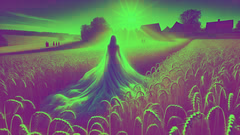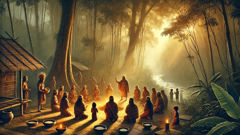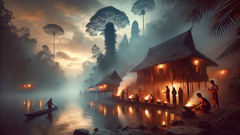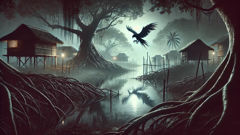Introduction
When the sun sits high and blinding over the endless fields of Poland, when the wheat bends and shimmers in golden waves beneath the burning sky, even the bravest villagers step softly. For centuries, parents have warned their children not to linger or work too long in the midday glare, when the world feels suspended between dream and fever. In these moments, the air itself grows heavy—buzzing with insects, distant with birdsong, and thick with a silence that presses against the chest. But it isn’t only the heat that keeps people indoors. Among the Slavic villages that dot the rolling countryside, there is a name whispered with dread: Polednice—the Lady Midday. She is a spirit who walks the fields at noon, her pale form wavering in the haze, her voice sharp as cicada song. They say she brings headaches, confusion, and madness to those who challenge her hours, and that her questions—tricks and riddles—can drive a person to delirium or worse. Some see her as an old woman in rags, hunched and wrinkled, her eyes burning with fever. Others describe her as a tall maiden, hair loose and white as flax, gliding with unnatural grace among the rye. No one agrees on her true shape, but all know her power. To the peasants of medieval Poland, whose survival depends on the earth’s bounty, the story of the Polednice is both a warning and a memory—a reminder that nature’s gifts come with dangers, and that even the sun’s brightest hours are touched by shadow.
I. The Village of Zlotniki and the Seeds of Caution
In the medieval heart of Poland, the village of Zlotniki huddled close to its own shadow. Mud-brick cottages lined crooked lanes, and narrow windows watched the world with caution born of old fears. The peasants here were tied to the soil by need and by tradition, rising with the rooster’s crow and returning only when dusk cooled the land. Every family told stories of loss—of crops flattened by storms, of fevers that swept through the young, of a world that could be generous but was never tame.
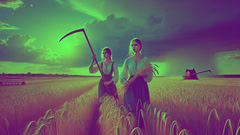
It was early June, the season when the fields outside Zlotniki stretched in a tapestry of green and gold. Children ran barefoot between furrows, snatching at grasshoppers and singing songs as old as memory. But even laughter had its boundaries. When the church bell tolled eleven, mothers called their children indoors, their voices sharp with anxiety. Men and women stooped beneath wide-brimmed hats, hands working faster as the light grew stronger. Noon was an hour of stillness, when even the animals retreated into burrows or shadowed corners of barns. Those who lingered risked more than sunburn—they risked the attention of the Polednice.
In this village lived Marzena, the miller’s daughter, whose life was shaped by both curiosity and necessity. Her mother, Agata, was a healer—keeper of herbs and secrets. Marzena learned early to respect the boundaries between safe and forbidden hours, but she was not afraid. She loved the whisper of wind in tall grass, the shimmer of heat on stone, and the endless questions the world seemed to ask her. Yet she had seen her uncle returned from the fields at noon, his mind muddled, skin hot as an oven. He’d survived, but his laugh never returned. The story of his encounter with the Lady Midday was told in hushed voices, every detail shifting with each retelling.
One spring, the crops were slow to ripen, and hunger gnawed at every household. The villagers debated working through midday, desperate to gather what little grain they had before a threatened storm. Agata’s voice was among the few urging caution, reminding them of the dangers. But the fear of famine often outweighed the fear of spirits. Marzena listened as the elders argued in the square, her gaze drifting past them to the distant fields, where sunlight already pulsed in white-hot waves. She wondered about the line between myth and reality—and what it truly meant to challenge the Lady Midday’s hour.
Rumors swirled like the dust kicked up by oxen hooves. Old Janusz claimed to have seen the Lady himself—a figure wavering near the edge of a wheat patch, asking impossible riddles. Others dismissed these tales as fever dreams, or warnings meant only to keep children safe. But no one could ignore the mounting unease. Every family prepared in their own way: some scattered poppy seeds at their doorsteps, others hung sprigs of mugwort in windows. Agata brewed teas for headaches, her hands trembling as she worked. Marzena watched her mother’s worry, feeling the weight of an old story pressing close.
The day came when the villagers could wait no longer. Clouds threatened in the west, black and tumbling, promising ruin if the grain was not gathered. Reluctantly, they agreed to work through noon—just this once. Marzena, strong for her sixteen years and swift of hand, joined her mother in the wheat fields, their scythes flashing like silver fish in the sunlight. Sweat ran in rivulets down their necks, and the heat grew so fierce it seemed the very air would ignite. Still they worked, each movement an act of hope and defiance. And all the while, Marzena’s heart beat with a strange exhilaration—a sense that she stood on the edge of something vast and unknown.
II. Noon Descends and the Lady Approaches
By midday, the fields had grown silent except for the dry hiss of wind combing through the stalks. The villagers’ numbers had thinned—some retreating to shaded edges, others pausing to sip sour kvass or mop their brows with kerchiefs. Marzena, stubborn and driven by the urgency of hunger, worked on, ignoring her mother’s pleas to rest. She barely noticed when Agata finally stepped back, settling beneath the thin shadow of a nearby tree, her face pale with exhaustion.
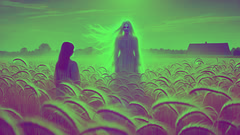
Marzena paused for breath, straightening to stretch her aching back. The air shimmered; her vision blurred at the edges. The world seemed to tilt, and for a heartbeat she thought she saw movement—a flicker of white at the edge of her vision. She blinked, and the shape resolved: a woman, tall and impossibly slender, standing amidst the ripening rye. Her hair was long and white as moonlight, drifting about her face like mist. Her dress was woven from something finer than linen, shimmering where it caught the sun. But her eyes were the most terrible: brilliant and feverish, as if lit from within by fire.
The woman glided forward, her feet barely disturbing the wheat. She stopped just out of reach, head tilted as if listening to a distant melody. Marzena tried to call out—a warning, a prayer—but her tongue stuck to the roof of her mouth. The Lady Midday’s lips curled into a smile that was neither kind nor cruel, but simply hungry.
"Why do you work beneath my sun, child?" The voice was thin and sharp, cutting through the heat like a blade.
Marzena wanted to answer, to explain about the storm, the hunger, the need that drove her to risk everything. But words slipped from her mind. Instead, she found herself whispering, "I have no choice."
The Lady circled her, moving with uncanny grace. "All mortals have choices. Some are wise enough to rest, others are not. Do you know my riddles, girl? Do you know the price of defiance?"
A wave of dizziness swept over Marzena, and she staggered. The Lady’s presence seemed to warp the very air—colors grew sharper, sounds faded, the world narrowed to this single encounter. Marzena’s heart hammered in her chest. She remembered her mother’s warnings, the old tales of those driven mad by the Lady’s questions.
"Will you answer, or will you fall?" the Lady whispered. Her hand reached out, impossibly long and thin, hovering inches from Marzena’s brow.
Desperate, Marzena clung to a memory—her mother reciting a prayer for protection, a rhyme about midday spirits and poppy seeds. With trembling lips, she began to recite it, each word a lifeline cast into darkness. The Lady’s eyes narrowed, and for a moment, her form flickered—becoming both ancient and young, beautiful and grotesque.
"You are clever," she said softly. "But cleverness is not always enough."
The ground seemed to spin; Marzena’s knees buckled. As she collapsed, she glimpsed her mother running toward her, arms outstretched, mouth open in a silent cry. The Lady stepped back, her shape dissolving into sunlight and shadow. For an instant, she seemed to smile—sorrowful, almost gentle.
"Remember," she breathed, "all gifts have their cost."
The world went white.
III. Madness and Mercy Beneath the Summer Sun
When Marzena awoke, the world had changed. Light stabbed at her eyes; her head throbbed with pain. Agata knelt at her side, weeping and whispering prayers. Around them, the wheat bent as if in mourning. The other villagers kept their distance, murmuring about curses and spirits. Marzena’s skin burned with fever, her thoughts darting like trapped birds.
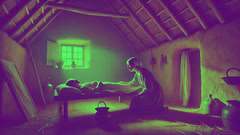
Days passed in a blur of delirium. Shadows writhed on the walls of their cottage; strange voices called her name. Sometimes she remembered the Lady’s questions—riddles about the color of wind, the taste of silence, the shape of fear. She tried to answer, but every reply dissolved into nonsense. At night, she dreamed of fields that stretched to forever, each stalk of wheat crowned with a white face, each one whispering: "Why did you work beneath my sun?"
Agata never left her daughter’s side. She brewed potions from willow bark and feverfew, bathed Marzena’s brow with cool river water, sang lullabies learned from her own mother. She scattered poppy seeds beneath the girl’s pillow, hung fresh bundles of wormwood by the door. The villagers brought what they could—eggs, bread, prayers. Some feared the illness would spread; others whispered that Marzena had been marked by the Polednice.
One afternoon, as thunder rolled in the distance and the sky turned the color of tarnished silver, Marzena’s fever broke. She awoke to find her mother asleep beside her, one hand still wrapped protectively around Marzena’s wrist. The world felt washed clean—strange, but mercifully quiet. For days she drifted between waking and sleep, slowly regaining her strength. Agata smiled through tears, grateful for this small miracle.
But Marzena had changed. The sunlight now seemed sharper, and every shadow hinted at hidden dangers. She remembered little of her encounter with the Lady Midday, but the sense of having crossed some invisible threshold lingered. She moved through the village like a ghost herself, wary of midday, listening for the faintest echo of riddles on the wind.
The harvest was saved, but not without cost. Some villagers fell ill in the days that followed—headaches, confusion, strange dreams. Most recovered, but one old man never regained his speech. The story of Marzena’s brush with the Lady Midday became part of village lore, recited in low voices by firelight: a warning about greed and desperation, a reminder that even necessity must bend to nature’s laws.
Conclusion
In time, life in Zlotniki returned to its familiar rhythm. Wheat once again waved in the fields each summer; children chased dragonflies under cautious eyes. The tale of the Lady Midday became a story parents told to keep their little ones safe—a legend woven into the fabric of daily life. But for Marzena, the world would never be quite the same. She grew into adulthood with a deep respect for both the generosity and danger of nature. She inherited her mother’s role as healer, gathering herbs at dawn or dusk, never at noon. Sometimes she would pause at the edge of a field and watch the sunlight shimmer on golden grain, feeling both gratitude and fear. And when the sun stood highest and the world held its breath, she remembered the Lady’s words: all gifts have their cost. To this day, in the villages of Poland and across Slavic lands, the story of the Polednice endures—a spectral warning etched in sunlight and shadow. It reminds all who labor under the open sky to honor the hidden rules of nature: to rest when the world demands it, to respect both bounty and peril, and to remember that some old stories are more than just tales—they are truths that shape the land itself.

